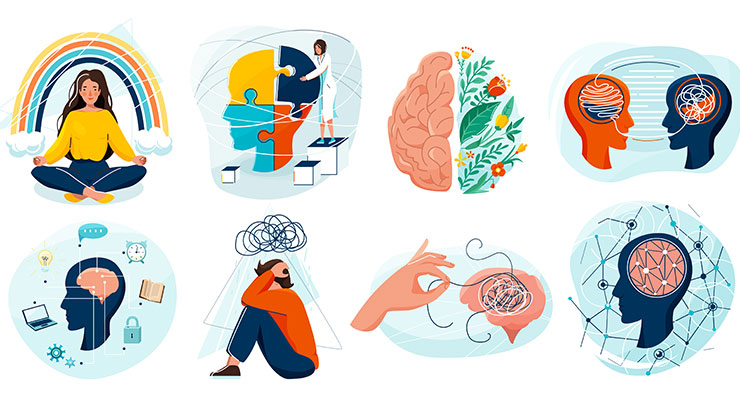What to Expect at an Inpatient Mental Health Facility for Rehabilitation
What to Expect at an Inpatient Mental Health Facility for Rehabilitation
Blog Article
Comprehensive Inpatient Mental Health And Wellness Providers for Effective Therapy
Inpatient psychological health services stand for an important element of the health care system, supplying a extensive and organized atmosphere for individuals experiencing serious mental distress. Checking out the nuances of this continuum reveals significant implications for both individual recovery and more comprehensive psychological wellness end results.
Recognizing Inpatient Mental Health And Wellness Services
Inpatient mental wellness solutions supply important support for individuals experiencing severe emotional distress that can not be taken care of successfully in an outpatient setting. These services are made to supply an extensive level of care in an organized atmosphere, typically within a healthcare facility or specialized facility. Patients confessed to inpatient programs normally show acute signs and symptoms, such as suicidal ideation, severe clinical depression, or psychosis, requiring round-the-clock surveillance and treatment.
The admission process generally includes a comprehensive analysis by mental wellness experts, who review the individual's psychological state, history, and prompt requirements. Once confessed, patients take part in a variety of healing modalities customized to their particular needs, including drug management, private therapy, and group sessions. This all natural method intends to stabilize the person's condition, advertise safety and security, and foster coping skills.
Inpatient psychological health services not just address immediate health and wellness concerns however additionally work as a bridge to continuous treatment. By offering a regulated setting, these services assist in the growth of treatment plans that can be proceeded in outpatient setups, thus making sure a continuum of treatment and improving long-lasting outcomes for individuals with intricate psychological wellness demands.
Secret Components of Effective Treatment
Effective treatment in inpatient psychological health and wellness solutions makes up a number of key components that cultivate recuperation and stabilization. A thorough analysis is necessary to recognize the individual's particular requirements and challenges. This analysis notifies the advancement of a customized therapy strategy, which acts as a roadmap for treatment.
Another essential component is the multidisciplinary group strategy. Cooperation amongst psychiatrists, psychologists, nurses, and social workers ensures that different viewpoints contribute to the client's treatment, improving the efficiency of treatment. Evidence-based restorative methods, such as cognitive-behavioral therapy (CBT) and dialectical behavior treatment (DBT), are likewise indispensable, providing structured strategies that attend to maladaptive thought patterns and behavior concerns.
-(1).jpg?v=1722502701)
Last but not least, a concentrate on aftercare preparation is important to ensure a smooth change to outpatient solutions, decreasing the risk of regression and advertising lasting wellness. These cumulative components produce an effective therapy framework within inpatient mental health services.
Advantages of Comprehensive Treatment

Thorough care in inpatient psychological wellness services uses countless benefits that considerably boost patient outcomes. Among the key benefits is the all natural strategy to treatment, resolving not only the emotional signs but additionally the physical, social, and emotional requirements of clients. This complete evaluation permits customized treatments that advertise general health.
An additional benefit is the combination of multidisciplinary teams, which promotes collaboration amongst health care specialists. This collective atmosphere makes sure that people obtain collaborated treatment, minimizing the threat of fragmented therapy and boosting communication amongst caregivers. Detailed treatment facilitates connection of solutions, allowing for smooth shifts from inpatient to outpatient settings, which is essential for lasting recovery.

Finally, the structured atmosphere of thorough inpatient treatment provides a risk-free room for patients to participate in therapeutic activities, aiding them establish coping methods and durability. Jointly, these benefits add to much more effective therapy and boosted top quality of life for people experiencing mental health and wellness situations.
Evidence-Based Therapeutic Techniques
In the this page world of mental health treatment, evidence-based healing approaches play a critical function in guaranteeing that people get reliable and medically sustained treatments. These approaches incorporate the ideal readily available research study with clinical competence and client values, promoting a customized therapy experience that attends to individual needs.
Cognitive Behavior Modification (CBT) is one of one of the most commonly identified evidence-based methods, concentrating on determining and transforming adverse idea patterns and behaviors. This organized technique has shown efficiency in dealing with conditions such as anxiety, clinical depression, and ptsd. Likewise, Dialectical Behavior Modification (DBT) is especially reliable for people with borderline character disorder, stressing the development of psychological guideline and social performance abilities.
Additionally, drug monitoring is typically an important element of evidence-based treatment, as psychotropic medications can alleviate signs and symptoms and enhance total functioning. Joint care designs, which involve multidisciplinary groups, even more improve the effectiveness of inpatient services by ensuring thorough analyses and continuous surveillance.
Inevitably, the combination my sources of evidence-based therapeutic techniques not just advertises favorable professional results but also empowers people, promoting a feeling of firm and strength in their mental health and wellness journeys.
Transitioning to Outpatient Support
The transition from inpatient psychological health and wellness services to outpatient support notes an essential stage in a client's healing journey. This duration needs mindful planning and coordination to make sure continuity of care and to reduce the dangers of relapse or situation. Efficient discharge planning need to commence early in the inpatient stay, involving a multidisciplinary group that consists of psychiatrists, psycho therapists, nurses, and social workers.
Secret components of an effective shift include the development of an extensive aftercare strategy customized to the individual's certain needs. This plan ought to outline follow-up appointments, medication management, and restorative treatments, along with determine area resources and support system that can promote ongoing recovery.
Moreover, individual and family members education is essential throughout this stage. Understanding the indicators of possible problems and the relevance of adhering to treatment can equip patients and their support group.
Normal follow-up and review of the outpatient strategy are important to resolve developing difficulties. By cultivating a collaborative relationship between inpatient and outpatient providers, the chance of continual healing increases, inevitably enhancing the person's top quality of life and minimizing the threat of readmission.

Final Thought
In recap, detailed inpatient mental health and wellness solutions use an article essential framework for dealing with serious psychological distress through a multidisciplinary strategy. By incorporating evidence-based treatments, cultivating a structured environment, and advertising family participation, these solutions boost treatment performance. The emphasis on stability and the development of coping abilities not just help in immediate recuperation however additionally promotes a smoother transition to outpatient care. Eventually, such detailed treatment is important for long-term psychological health and health.
The admission process usually includes a thorough assessment by mental wellness professionals, that examine the person's psychological state, history, and immediate demands.Effective treatment in inpatient mental health services comprises a number of crucial elements that foster recovery and stabilization.Comprehensive treatment in inpatient mental health and wellness services offers countless advantages that substantially improve individual results.The transition from inpatient mental wellness solutions to outpatient support notes a critical stage in a client's recovery journey.In recap, detailed inpatient psychological wellness solutions provide a necessary framework for resolving extreme psychological distress via a multidisciplinary strategy.
Report this page